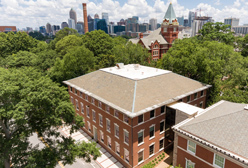New Funded Research Center
Intel Corporation has funded a new $1.625 million Intel Science and Technology Center for Social Computing (ISTC-Social) in the School of Literature, Media, and Culture (LMC). Professors Carl DiSalvo, Ian Bogost, and Christopher Le Dantec are partnering with researchers at the ISTC-Social hub center at the University of California, Irvine and centers at Cornell, Indiana, and New York Universities. (See feature story)
New Sponsored Research
Marilyn Brown and Paul Baer, professors in the School of Public Policy, have been awarded $125,000 in supplemental funding for the project "Behaviorally Based Policies For Better Buildings" by Battelle/Oak Ridge National Labs. Total funding for the project is now $225,000.
Susan Cozzens, professor in the School of Public Policy, has been awarded $179,487 by the National Science Foundation for the project "Collaborative Research: Women in Science and Technology Policy."
Margaret E. Kosal, assistant professor in The Sam Nunn School of International Affairs, has been awarded a $125,000 grant to support research on “Military Applications of Nanotechnology: Implications for Strategic Security” from the Department of the Navy through the Project on Advanced Systems and Concepts for Combating Weapons of Mass Destruction (PASCC).
The Georgia Council for the Arts has continued its support for the Poetry@Tech program directed by Thomas Lux, professor in the School of Literature, Media, and Communication by providing $2,700 in operating funds.
The National Science Foundation has awarded an additional $10,000 to Brian Magerko, assistant professor in the School of Literature, Media, and Culture (LMC), and Jason Freeman (COA), for the project "EarSketch: Engaging African Americans in Computing through the Composition and Sharing of Musical Remixes." The total grant for the project is now $1,025,881.
Julia Melkers, professor in the School of Public Policy, with Jan Youtie in the Georgia Tech Enterprise Innovation Institute (EI2), have been awarded $76,348 for the project "A Coordinated Plan for More Effective and Efficient Science of Learning Centers (SLC) Evaluation and Reporting." The grant from the National Science Foundation was funded through Gallaudet University in Washington, D.C.
The Japan Foundation awarded Rumiko Simonds, professor in the School of Modern Languages, $24,238 for the Japanese Language Courses project.
The Center for Advanced Communications Policy (CACP) in the School of Public Policy has been awarded $50,000 by the National Council on Disability for the project "Effective Communications for People with Disabilities: Before, During, and After Emergencies." James White, CACP director of Communications Studies is the PI.
New Faculty Books
Contours of African American Politics (Transaction Publishers) edited by Georgia A. Persons, professor in the School of Public Policy. The book chronicles the systematic study of African American politics and its subsequent recognition as an established field of scholarly inquiry. The two-volume set presents a selection of scholarship on African American politics as it appeared in The National Political Science Review from 1989 to 2009.
Ethnography and Virtual Worlds: A Handbook of Method by Tom Boellstorff, Bonnie Nardi, Celia Pearce, and T. L. Taylor. A concise, comprehensive, and practical guide for students, teachers, designers, and scholars interested in using ethnographic methods to study online virtual worlds, including both game and nongame environments.
What Does Georgia Tech Think?
Selected Press for Ivan Allen College of Liberal Arts
|
Rosser on Women's Careers in Science
It’s “the most compelling argument” that women “deserve the same opportunities as men” to do science. “Rosser’s gender-based analysis provides information that universities can use to help make that possible. It also offers guidance for women seeking to maneuver astutely in the competition for academic advancement,” writes Science Career Magazine in a special issue on Women in Science featuring Sue V. Rosser, professor emerita of the School of Public Policy and former dean of the Ivan Allen College. The article highlights Rosser’s career path and her voice in gender and research. Source: Science Careers - June 1, 2012
Klein on How to Spot Twitter Propaganda
"We rely on media to serve as our window on the world, but media can also distort what we see. It can act as a lens or as a filter, enlarging some topics and minimizing others," said Hans Klein, associate professor in the School of Public Policy. "Such media effects have long been studied in the mass media. This research looks for similar propaganda-like effects in new media like Twitter." Source: Huffington Post – June 1, 2012
September 6, 2012
4:00 pm
September 7, 2012
2:00 pm
September 11, 2012
3:00 pm
September 14, 2012
2:00 pm
September 25, 2012
5:00 pm
September 27, 2012
7:30 pm
September 28, 2012
2:00 pm
|

|
Intel Funds Ground-Breaking Social Computer Center in School of Literature, Media, and Communication
In a paradigm-breaking approach, Intel has announced a new Intel Science and Technology Center for Social Computing (ISTC-Social) involving the Georgia Tech Ivan Allen College of Liberal Arts as a research partner supported by $1.625 million in funding. Intel’s commitment affirms liberal arts-based research as a leading edge for third-wave computing.
“This is really quite daring,” said Carl DiSalvo, associate professor in the Ivan Allen College of Liberal Arts School of Literature, Media, and Communication, which houses one of the nation’s top graduate programs in digital media. “The research convention has been to create a technology and then find a use for it. ISTC-Social shifts that to the innovation occurring in the humanities and social sciences. We begin with cultural and societal analysis, imagine social contexts or societal goals, and those become the driver for creating technology.”
Intel CTO, Justin Rattner, announced the new center June 26 during the annual Research at Intel event. This is the third ISTC at Georgia Tech. Faculty in the College of Computing are part of ISTCs for Embedded and Pervasive computing. ISTC-Social is the first Intel-academic collaboration to span technology, social sciences and humanities. The premise is that technology, culture, politics and computing are inextricably intertwined and so are essential to study in amalgam.
“This type of innovation at the crossroads of humanities, social sciences and technology has been a hallmark of liberal arts at Georgia Tech,” said Ian Bogost, professor of the School of Literature, Media, and Communication Graduate Program in Digital Media. “ISTC-Social will further enable our research on completely novel forms of social computing.”
DiSalvo, Bogost and colleague Christopher Le Dantec will partner with researchers at Intel and the ISTC-Social hub at the University of California, Irvine, as well as with faculty in centers at Cornell, Indiana and New York Universities. The work will converge across informatics, anthropology, communication, digital humanities, cultural studies, science and technology studies, media studies, philosophy, computer science and design. The Georgia Tech center will lead research on Creativity and Collectivity, specifically, how group production and ‘patterns of making’ are changing what it is to be creative.
“One future of media is social, and people in humanities and social sciences understand what makes things social,” said DiSalvo. “Third-wave computing is moving us from the era of one person using one device, to massively networked, mobile and cloud computing, but it is the liberal arts-based exploration of how we use those technologies that will really reinvent the future.”
|
Colatrella and Murray Named Associate Deans for Ivan Allen College of Liberal Arts
Dean Jacqueline J. Royster has named Carol Colatrella as Associate Dean for Graduate Studies and Janet Murray as Associate Dean for Research and Faculty Affairs. Both are professors in the Ivan Allen College School of Literature, Media, and Communication (LMC).
The appointments restructure responsibilities previously combined under the position of Associate Dean for Research/Faculty Development, a role held by Susan Cozzens, who moved to the position of Georgia Tech Vice Provost of Graduate Education and Faculty Affairs on June 1.
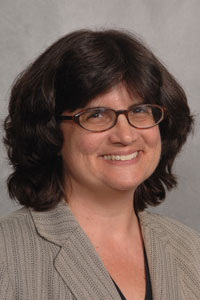 Carol Colatrella - Associate Dean for Graduate Studies Carol Colatrella - Associate Dean for Graduate Studies
Dr. Colatrella is a two-time Fulbright scholar and an award-winning teacher who is active in programmatic and administrative roles both on campus and externally.
She is a long-time co-director of the Georgia Tech Center for the Study of Women, Science, and Technology (WST), which is part of the Office of the Vice President for Institute Diversity. WST sponsors technical and scholarly presentations, career development workshops, and focused research programs, and coordinates mentoring networks for faculty and students, including the WST Learning Community. From 2005 to 2007, she served as program director of the Georgia Tech-National Science Foundation ADVANCE Institutional Transformation program.
Colatrella received her Ph.D. in Comparative Literature from Rutgers University. Her research ranges across nineteenth- and twentieth-century American and European literary, historical, and scientific narratives, particularly those emphasizing moral transgression and social marginality. Her scholarly work is strongly interdisciplinary and has been funded by national and international foundations. She held Fulbright fellowships based in Denmark in 2000 and in 2005-06, during the latter working with an international group of scholars. Other fellowships include a Nunn School European Union Center Grant for 2010-11 and a residency at Zentrum für Literatur- und Kulturforschung, Berlin in June 2008. Colatrella has co-edited two books and authored and/or co-authored 35 book chapters and articles and three books, most recently Toys and Tools in Pink: Cultural Narratives of Gender, Science, and Technology (The Ohio State University Press, 2011).
Since 1993, she has served as executive director of the Society for Literature, Science, and the Arts. She is a manuscript reviewer for a number of journals, including the Journal of Narrative Technique, the Journal of Technology Transfer, Leviathan: A Journal of Melville Studies, and for presses, including the University Press of Florida and the Modern Language Association.
Colatrella was recognized in 2007 with Georgia Tech’s Geoffrey G. Eicholz Faculty Teaching Award and in 2005 with Georgia Tech’s Outstanding Service Award. She supervises graduate research assistants and undergraduate research projects.
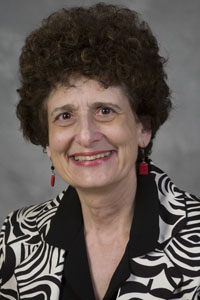 Janet Murray - Associate Dean for Research and Faculty Affairs Janet Murray - Associate Dean for Research and Faculty Affairs
A primary focus for Janet Murray as Associate Dean for Research and Faculty Affairs will be to cultivate and mentor faculty research and foster connections with research efforts in other Georgia Tech colleges. She will work to further expand Ivan Allen College’s top-ranked $6M annual portfolio in humanities and social sciences sponsored research.
An IAC Dean’s Professor, Murray is a prominent scholar in the field of digital media and the application of digital technology in education, scholarship, entertainment, and art. She directed LMC’s top-ranked Graduate Program in Digital Media from 1999 through 2011, during which she established the program as a national and international curricular model for a humanistic approach to the design of digital media.
During the course of her career, Murray has secured more than $4.5 million in research funding by a wide range of private and public sources including IBM, Apple Computer, the Annenberg-CPB Project, the Andrew W. Mellon Foundation, the National Endowment for the Humanities, and the National Science Foundation. Through the Experimental Television Laboratory which she directs, Murray has developed research partnerships with PBS, ABC, MTV, Turner, Motorola, Alcatel-Lucent, Intel Corporation, the American Film Institute and other media innovators. She is a member of the interdisciplinary GVU Center and has worked closely with researchers at GTRI, GCATT, and in the College of Engineering where she was co-PI on an NSF project that created innovative computer-based exercises for learning Statics.
Murray holds a Ph.D. in English from Harvard University, and before coming to Georgia Tech taught humanities and led advanced interactive design projects at MIT. Her books Hamlet on the Holodeck: The Future of Narrative in Cyberspace, and Inventing the Medium: Principles of Interaction Design as a Cultural Practice (both published by MIT Press) are widely used as foundational texts in media studies and HCI.
She is a member of Georgia Tech's interdisciplinary GVU Center. She helped develop Georgia Tech’s program in Women in Science and Technology and supported implementation of the ADVANCE program on campus. She has served on the IAC Dean’s Promotion and Tenure Committee and the Provost’s Task Force for Interdisciplinary Study. From 2000-2009, she served as a trustee of the American Film Institute and is currently on the board for the George Foster Peabody Award. In 2010 Murray was named one of the "Top Ten Brains of the Digital Future" by Prospect Magazine.
Dr. Murray assumed her new role July 1st. Dr. Colatrella will began in her new position August 15th.
|
LCC is Renamed as School of Literature, Media, and Communication
|
|
|
|
The Ivan Allen College of Liberal Arts School of Literature, Communication, and Culture (LCC) announces its renaming as the School of Literature, Media, and Communication (LMC), effective August 1, 2012. The name change implements a recommendation from the most recent five-year program review for LCC that it be rebranded in order to emphasize core disciplines and provide external constituencies with a better sense of the degree emphases. The new name also underscores the increased prominence of media science and technology in the school’s teaching and research. “The new name, School of Literature, Media, and Communication, highlights the pervasiveness of media throughout our curricula and research, as well as the importance of media science and technology as a discipline,” said Richard Utz, Chair of LMC. “We are more clearly indicating to students, parents, and employers, as well as the academic community, the knowledge, competencies, and skills encompassed by our programs.” In concert with the school’s renaming, LMC is preparing to rebadge its undergraduate B.S. degree in Science, Technology, and Culture (STAC) as Literature, Media, and Communication (LMC). That renaming awaits Board of Regents approval. The school’s other degrees, the B.S. in Computational Media and the M.S. and Ph.D. degrees in Digital Media will remain unchanged. LMC continues to engage a wide range of humanities disciplines, including literature, film, theater, performance studies, digital arts, and creative writing. LMC Professor Jay Telotte, the departing Interim Chair who oversaw the renaming process, said, "This name change better positions us to take advantage of the rapidly expanding technological and entrepreneurial opportunities in the fields of media and communications.” In addition to its undergraduate and graduate degree programs, LMC continues to teach foundational communication courses for all Georgia Tech students including first-year English, technical communication, and general humanities classes. The name change continues the evolution of one of Georgia Tech’s founding disciplines. LMC traces its origin back to 1888 and the central place of English in the Institute’s early curriculum. When Georgia Tech opened its doors, English was one of the six subjects taught and required for all students, from “apprentices” through seniors. In 1898 the Department of English was established and headed by Reverend Charles Lane. By the 1950s English was part of the General College, later part of the College of Science and Liberal Studies. In 1990 when the Ivan Allen College was founded, it became the School of Literature, Communication, and Culture. |
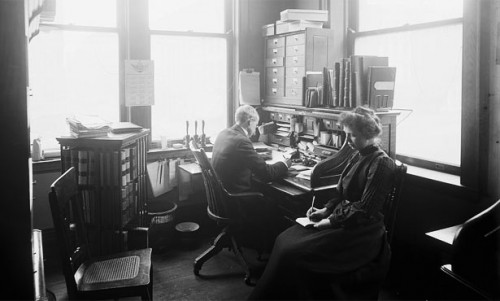
|
Siri, Take This Down: Will Voice Control Shape Our Writing?
The following article by Robert Rosenberger, assistant professor in the School of Public Policy, was published in The Atlantic on August 1, 2012.
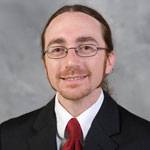 In the future, you will talk to your computer. Voice, the predominant mode of human-to-human communication, has been migrating to silicon for more than a decade and is now poised to hit the mainstream. In the future, you will talk to your computer. Voice, the predominant mode of human-to-human communication, has been migrating to silicon for more than a decade and is now poised to hit the mainstream.
Already, voice interfaces have become commonplace in the telephone customer-service industry, have long been of assistance to the blind, and are increasingly used by doctors for transcribing patient information. Even your less-tech-savvy relatives may have seen, for example, the recent profile of Nuance Communications in the New York Times. Nuance is the big fish in the small pond of dictation programming development, and the force behind Dragon, the highly-regarded though still expensive dictation-software package, as well as Siri, the iPhone 4S personal-assistant application, and the Ford "Sync" system's voice-command interface. Google's concept video for "Project Glass" includes voice-to-text translation.
So it seems as though our voices may some day displace our keyboards and mice as the primary means through which we manipulate our computing devices. But while to command by voice is one thing, to write by voice is another, and the question remains whether -- or how -- this shift in technology will shape the words we "pen."
The relationship between writing technology and writing itself is by no means clear, but we can look to history for insights into past shifts in popular writing tech. For example, in a series of lectures in the 1940s philosopher Martin Heidegger fretted over the growing influence of the typewriter:
"In the time of the first dominance of the typewriter, a letter written on this machine still stood for a breach of good manners. Today a hand-written letter is an antiquated and undesired thing; it disturbs speed reading. Mechanical writing deprives the hand of its rank in the realm of the written word and degrades the word to a means of communication. In addition, mechanical writing provides this "advantage" that it conceals the handwriting and thereby the character. The typewriter makes everyone look the same."

If the shift from handwriting to typewriters raised such concerns, what of the shift to computers? Though the keyboard was more or less the same, would the distinctions of computerized word processing shape writing in subtle ways? Susan Sontag thought no, that computers were much the same as typewriters. She explained, "Someone was marveling that I moved with so much pleasure to the word processor. And I said, 'The leap is from writing by hand to the typewriter. From writing with a typewriter to using a computer is no leap at all.' " But for Joan Didion, the particularities of the computer did seem in some ways distinct from her typerwriter, and more efficient to boot. She said:
"I use an IBM Thinkpad. I just use it like a typewriter, but when I started using it in 1987, I thought I won't be able to write anymore, so I thought I'd go back to the typewriter. But you couldn't go back to the typewriter after using the computer, so finally after about a month I got proficient enough that I could actually work on it without being distracted by it, and in fact then it started making me a whole lot more logical than I ever had been. Because the computer was so logical, it was always right, I was wrong ... and the time saved."
Other writers have observed that efficiency and opted against it. For example, biographer David McCullough prefers a vintage typewriter, reasoning that, "I don't want to go faster. If anything, I probably ought to go more slowly... When rewriting, I'm not just typing it all over again, I'm thinking through it again, rethinking, rewording where need be, saying it a little differently on second thought." That is, a disadvantage that comes with the time saved by computerized writing is that it discourages the moments of contemplation afforded by less efficient writing technologies.
Two important points emerge from these snippets from the history of reflection on writing technologies. First, writing technologies do not by themselves appear to compel us to write or think in one way or another. It seems at least possible to express the same general thoughts with a pen, typewriter, or word processor.
Second, and at the same time, these technologies do have some influence on our writing and thinking. Writing technologies appear to incline certain styles, disincline others, lean authors toward more or less reflectivity, and supply both conveniences and inconveniences. As Nietzsche said, "Our writing instruments contribute to our thoughts."
So discussions of how our method of writing affects our writing are nothing new. As we begin to think about how a future of dictated writing will look, we should keep in mind that dictation is nothing new either, and we can look to the past for evidence about what dictated writing will be like. For example, Milton was blind by the time he wrote Paradise Lost and is said to have composed the entire epic through dictation. A discussion has emerged over the later writing of Henry James, incited by the expansive biographical work of Leon Edel, about whether changes in James' style are attributable to a move to dictation. And Amy Rowland has recently argued -- based on her own experience taking dictation for journalists and also on accounts of historical figures such as Dostoevsky's "collaborator" (and, later, wife) Anna Grigorievna -- that there are substantial differences between a responsive human transcriptionist and automated dictation software. Rowland claims, "past authors have dictated to humans and their corporeal responses have contributed to aesthetic production, if in untraceable ways."
 The recently released first volume of the "complete and authoritative" Autobiography of Mark Twain provides a rich example. Twain eschewed the conventional autobiographical format of simply recounting major events in more or less the order in which they occurred in life, and he instead jumped from story to story, entertaining each only so long as it held his attention. He argued that this would lead to a fresher and more truthful portrait. And he found that traditional writing with pen and paper did not lend itself to his preferred autobiographical form, explaining that, "With a pen in the hand the narrative stream is a canal; it moves slowly, smoothly, decorously, sleepily, it has no blemish except that it is all blemish. It is too literary, too prim, too nice; the gate and style and movement are not suited to narrative." It's striking just how opposite Twain is to Heidegger here. For Twain, the truthfulness and authenticity of an autobiographical account would actually be hindered by the formality and lingering pace of handwriting. He took to speaking his stories to transcriptionists, claiming, "One would expect dictated stuff to read like an impromptu speech -- brokenly, catchily, repetitiously, & marred by absence of coherence, fluent movement, & the happy things that didn't come till the speech was done -- but it isn't so." However, some critics have pointed to this unfocused, meandering, and perhaps self-indulgent style as exactly the central drawback of the work. The recently released first volume of the "complete and authoritative" Autobiography of Mark Twain provides a rich example. Twain eschewed the conventional autobiographical format of simply recounting major events in more or less the order in which they occurred in life, and he instead jumped from story to story, entertaining each only so long as it held his attention. He argued that this would lead to a fresher and more truthful portrait. And he found that traditional writing with pen and paper did not lend itself to his preferred autobiographical form, explaining that, "With a pen in the hand the narrative stream is a canal; it moves slowly, smoothly, decorously, sleepily, it has no blemish except that it is all blemish. It is too literary, too prim, too nice; the gate and style and movement are not suited to narrative." It's striking just how opposite Twain is to Heidegger here. For Twain, the truthfulness and authenticity of an autobiographical account would actually be hindered by the formality and lingering pace of handwriting. He took to speaking his stories to transcriptionists, claiming, "One would expect dictated stuff to read like an impromptu speech -- brokenly, catchily, repetitiously, & marred by absence of coherence, fluent movement, & the happy things that didn't come till the speech was done -- but it isn't so." However, some critics have pointed to this unfocused, meandering, and perhaps self-indulgent style as exactly the central drawback of the work.
One circumstance that may arise in a future in which computerized dictation has become the default means of writing is a general decline in our ability to compose formal long-form written works. Since in this imagined future all everyday writing -- personal and occupational -- is performed through computerized voice-to-text translation, people may achieve a level of writing proficiency that reflects only their extemporaneous speech. That is, we may come to write only as well as we talk. (This will of course not be the case for everyone. Professional writers, such as journalists or public relations specialists, will continue to write as formally and carefully as the task demands, and would abandon dictation if it proves to be poorly suited for the job, or, more likely, would take up a kind of typing/dictation hybrid.)
An analogous issue today is the concern sometimes raised about the effects of the Internet on reading skills. Critics contend that Internet reading is characterized largely by skimming and divided attention. And they argue that since we nowadays do so much of our reading online, we are being retrained as poor and distracted readers. In a similar way, by writing mainly through speaking to dictation technologies, everyday writers will be retrained to write in only the more casual manner in which they talk.
In some ways we are now entering the reverse of the process that Plato discussed in his dialogue the Phaedrus, as he imagined what it may have been like for those people, ancient to him, who were around when writing itself was new. He considered the disadvantages that come with the practice of writing, for example, critiquing the written word for causing forgetfulness by providing a way to record things that we would otherwise actively work to remember. Plato's larger criticism of the written word is that it fails to meet what he thought was the ideal method for investigation and learning, namely, critical back-and-forth discussion. He claims that once ideas are written down, "they are tumbled about anywhere among those who may or may not understand them, and know not to whom they should reply, to whom not: and, if they are maltreated or abused, they have no parent to protect them; and they cannot protect or defend themselves." That is, written words cannot answer any questions, clarify themselves, or respond to challenges. Thus, in Plato's view, writing is a less ideal way for teaching and for investigation than active conversation.
In the case of voice-to-text technologies, however, all writing becomes a kind of rehearsal for verbal interaction. In this light, an important effect of computerized dictation technologies is that they could lead people to become more skillful speakers, and thus more thoughtful participants in meaningful discussions. If writers of the future are composing text almost exclusively through computerized dictation, then they may become more thoughtful and nuanced speakers in the process. That is, the effect of dictation technologies may not be just on our writing, but that they may train us to be better verbal communicators, not just with our machines but with our fellow humans too.
|
Four Telltale Signs of Propaganda on Twitter
As Election Day 2012 draws nearer, the “Twitterverse” promises to light up again and again with explosions of political opinion. But which tweets are the genuinely expressed feelings of individual users and which are systematic disseminations of information meant to support or discredit an idea — the textbook definition of propaganda?
A new study by researchers at in the College of Computing and Ivan Allen College of Liberal Arts calls such patterns of communication “hyperadvocacy.” The study identifies four characteristic behaviors of Twitter hyperadvocates, whose actions clearly separate them from the tweeting behavior of typical users. Hans Klein, associate professor in the School of Public Policy, worked on the study which was directed by Nick Feamster, in the College of Computing, and former postdoctoral researcher Cristian Lumezanu.
The study examined tweets from two recent politically charged U.S. events: the 2010 U.S. Senate race in Nevada and the 2011 debate over raising the U.S. debt ceiling. Collecting tweets that used the hashtags #nvsen and #debtceiling, the researchers were able to gather approximately 80 percent of all tweets on those issues during the time frame under study. From a dataset of nearly 100,000 tweets for the two issues combined, Feamster and his colleagues identified the following behaviors that characterize propagandistic activities on Twitter by users on both sides of the partisan aisle:
- Sending high volumes of tweets over short periods of time;
- Retweeting while publishing little original content;
- Quickly retweeting others’ content; and
- Coordinating with other, seemingly unrelated users to send duplicate or near-duplicate messages on the same topic simultaneously.
“As social media become more and more ingrained in our culture, and as people use social media more as a source of information about the world, it’s important to know the provenance of that information—where it’s coming from and whether it can be trusted,” Feamster said. “As a user, you might think the information you see is coming from lots of different sources, but in fact it can be part of an orchestrated campaign.”
Indeed, the very aspect of Twitter that makes it appear less amenable to traditional propaganda also makes it difficult to address with traditional content analysis techniques. Historically researchers could sift through the content of major media vehicles (The New York Times or Wall Street Journal, for instance) looking for “extreme” language, but such methods are often rendered meaningless in the world of social media where the huge number of users makes it nearly impossible to identify a baseline “standard” language.
“Twitter is a sort of ‘extreme democracy’– everyone’s a publisher, and people can say whatever they want with no rejection or limit. It’s complete freedom of expression,” said Lumezanu, now a researcher at NEC Laboratories America in Princeton, N.J. “We had to come up with a way to identify hyperadvocate behavior that didn’t try to politically valuate content, because in Twitter the content often can be misleading.”
Rather than identify propaganda-like communication by focusing on content, Lumezanu proposed examining behavior instead. The term “hyperadvocacy” is politically neutral and refers simply to those users and content that are consistently biased toward a specific point of view, without necessarily having a malicious or subversive intent. Starting with the tweets from users whose political stance was clearly known (such as public figures), the researchers used existing algorithms that rely on examining retweeting patterns to determine clusters of users with similar political ideologies. Then they identified as hyperadvocates those users who retweeted predominantly messages of users in the same cluster. These users consistently demonstrated the four characteristic behaviors described above.
In short, the study provides solid preliminary evidence in social media for the kind of message influencing that has long been known to exist within traditional media. Some messages were repeatedly retweeted, creating an echo chamber effect that increased the perceived legitimacy of the positions advocated in those tweets. Researchers also found some differences in tweeting behavior between the two issues under study. For example, the Nevada Senate race had a smaller number of individual tweeters but a relatively larger number of high-volume tweeters, whereas hyperadvocacy in the debt-ceiling debate was affected through more widespread retweeting of low-volume users.
“We rely on media to serve as our window on the world, but media can also distort what we see. It can act as a lens or as a filter, enlarging some topics and minimizing others,” said Klein, who directs the Internet and Public Policy Project. “Such media effects have long been studied in the mass media. This research looks for similar propaganda-like effects in new media like Twitter.”
The study is described in the paper “#bias: Measuring the Tweeting Behavior of Propagandists,” which Lumezanu will present at the 6th International AAAI Conference on Weblogs and Social Media (ICWSM ’12), to be held June 4-6 at Trinity College in Dublin, Ireland.
|
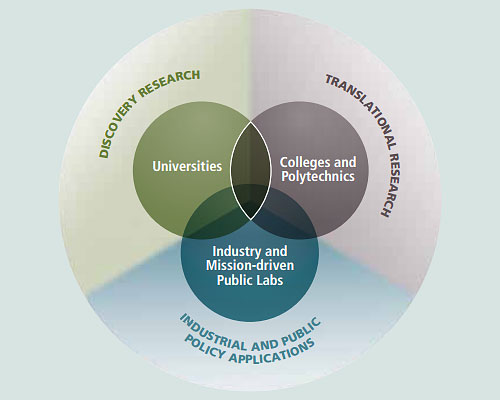
|
International Panel Recommends Formula for Science Allocation Funding
An international expert panel has recommended that allocations for science funding be based upon a combination of performance indicators and expert judgement, rather than by metrics alone.
The panel’s report, Informing Research Choices: Indicators and Judgement, provides an in-depth analysis of the evidence relevant to science indicators and also examines science assessment practices used by funding agencies around the world.
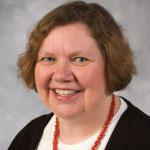 “The report makes a positive statement on the ways indicators can be used in conjunction with expert judgment in the program evaluation process,” said Susan E. Cozzens, professor in the School of Public Policy and director of the Technology Policy and Assessment Center, who was one of the sixteen panelists. “The catalogue of indicators provided has been vetted with the world’s experts and should prove widely useful.” “The report makes a positive statement on the ways indicators can be used in conjunction with expert judgment in the program evaluation process,” said Susan E. Cozzens, professor in the School of Public Policy and director of the Technology Policy and Assessment Center, who was one of the sixteen panelists. “The catalogue of indicators provided has been vetted with the world’s experts and should prove widely useful.”
The panel was convened by Council of Canadian Academies at the behest of the Natural Sciences and Engineering Research Council of Canada (NSERC) which spends approximately one billion dollars a year on scientific research. The objective was to examine concerns that funding decisions made based upon historical funding patterns are not the best way to determine future funding decisions.
Download the report released to the public July 5, 2012.
|
Bier selected as Fulbright Scholar
|
|
Congratulations to Laura E. Bier, assistant professor in the School of History, Technology, and Society, who has been selected as a Fulbright Scholar for 2012-2013. Bier's third Fulbright, this grant will support her in carrying out nine months of research in Egypt for her second book, tentatively entitled: "Cultures of Consumption: Commodification, Politics and Everyday Life in Modern Egypt, 1945-1991." The project examines the relationship between commodity cultures, changing patterns of consumption, and modern advertising in the making of Egypt (and Egyptians) from the period following World War II to the era of neo-liberal economic reform. The book will focus on three types of commodities—processed foods, household goods, and toiletries. One of the case studies that Bier will use is Coca-Cola, which was first available in Egypt after World War II as a luxury good and then became common in urban life and culture until 1966 when the country joined the Arab boycott. Sponsored by the U.S. government, the Fulbright Scholar Program is an international exchange that supports faculty and scholars in lectures and research in a wide variety of academic and professional fields. Related Links |
Dhongde Awarded Ruggles Prize
|
|
Congratulations to Shatakshee Dhongde, assistant professor in the School of Economics, who, in August, was awarded the Nancy and Richard Ruggles Memorial Fund Prize for her paper, “Measuring Segregation of the Poor in India.” In the paper, Dhongde proposes a poverty segregation curve to measure regional inequality in the distribution of the poor in India. Her studies indicate that, since the economic reforms of the early 1990s, there has been a significant increase in the segregation of the poor in India, particularly in the urban sector. The Ruggles Prize aims to develop the scholarship of young researchers. Dhongde was presented the Prize at the at the International Association for Research in Income and Wealth (IARIW) General Conference held in Boston. |
Kosal Selected as Fellow for Army Strategic Studies Group
|
|
Margaret E. Kosal has been selected as a fellow of the Chief of Staff of the Army’s (CSA) inaugural Strategic Studies Group (SSG). Kosal, assistant professor in The Sam Nunn School of International Affairs, will join the SSG as a civilian fellow and will be researching and analyzing strategic issues for U.S. ground forces and national security. She will lead advising on innovation of national security approaches at the intersection of human factors, science, technology, policy, and processes. The SSG works exclusively for the CSA, General Ray Odierno, and conducts independent research and analysis to generate strategic and operational concepts for land forces. Kosal will lead research and analysis focusing on challenges for ten to twenty-five years in the future. A leading expert in strategy, technology, and governance, Kosal’s research focuses on two, often intersecting, areas: reducing the threat of weapons of mass destruction (WMD) and understanding the role of emerging technologies for security. She co-directs the Program on Emerging Technology and Security and directs the Program on Biological and Chemical Nonproliferation and Counterterrorism, both located within The Nunn School’s Center for International Strategy, Technology, and Policy (CISTP). Prior to joining The Nunn School, Kosal was Science and Technology Advisor within the Office of the Secretary of Defense (OSD). She also served as the first liaison to the Biological and Chemical Defense Directorate at the Defense Threat Reduction Agency (DTRA). |
Nersessian book Selected APA 2012 William James Book Award
Science as Psychology: Sense-Making and Identity in Science Practice (Cambridge University Press, 2011) by Dr. Nancy Nersessian and co-authors has been awarded 2012 William James Book Award.
A Regent's Professor of cognitive science in the School of Public Policy and the College of Computing, Nersessian co-wrote the book with members of her research group: Lisa M. Osbeck and Kareen R. Malone at the University of West Georgia and Wendy C. Newstetter in biomechanical engineering at Georgia Tech.
The book reveals the complexity and richness of rationality by demonstrating how social relationships, emotion, culture, and identity are implicated in the problem-solving practices of laboratory scientists. A co-winner of the 2012 award, the book was recognized for its "scope and breadth in approach to a new conceptualization and application of general psychology."
Sponsored by Society for General Psychology Division I, the William James Book Award honors books that integrate material across psychological subfields or provide coherence to the diverse subject matter of psychology. Nersessian will make an award presentation at the APA (American Psychological Association) convention in Hawaii 2013.
|
Sam Nunn Elected to Hess Corporation Board of Directors
Hess Corporation announced the election of former U.S. Senator Sam Nunn, distinguished professor in the Sam Nunn School of International Affairs, to its Board of Directors.
Senator Nunn is co-chairman and chief executive officer of the Nuclear Threat Initiative (NTI), a charitable organization working to reduce the global threats from nuclear, biological, and chemical weapons. He has continued his service in the public policy arena as a distinguished professor in The Nunn School and as chairman of the board of the Center for Strategic and International Studies in Washington, D.C. He is also a board member of The Coca-Cola Company and General Electric Company. Hess Corporation is a leading global independent energy company engaged in the exploration for and production of crude oil and natural gas, as well as in refining and in marketing refined petroleum products, natural gas and electricity.
|
Wang Receives Minerva Fellowship from DOD/Air Force
|
|
Fei-Ling Wang, professor in The Sam Nunn School of International Affairs, was invited to serve a one-year appointment as a Minerva Research Fellow in the Department of Political Science of the U.S. Air Force Academy in Colorado Springs. Wang began the fellowship in June. His work focuses on teaching, research, and field studies in “U.S. - China Strategic Relations.” The fellowship is funded by a grant from the U.S. Department of Defense/Air Force. Wang will be on leave from The Nunn School through May 2013. |
Public Policy Alumna Named Interim President of South Carolina State University
Cynthia Warrick, alumna of the School of Public Policy, became interim president of South Carolina State University on July 1.
“I have an entrepreneurial approach to higher education and I’m very secure in my abilities to raise funding to develop the types of programs needed to move South Carolina State University forward,” Warrick said in a news release.
She replaced acting President Rita Teal. “Dr. Warrick is highly qualified and will bring new energy and creativity to S.C. State University,” said John H. Corbitt, acting chairman of the board.
A native of San Antonio Texas, Warrick earned a bachelor’s degree in pharmacy from Howard University, a master’s degree in public policy from the Georgia Institute of Technology, and a doctorate in environmental science and public policy from George Mason University.
As a senior fellow in the Howard University School of Pharmacy Center for Minority Health Services Research, Warrick developed research proposals, mentored faculty and students, participated on search committees, recruited students, participated on federal advisory committees and reviewed grants for federal agencies. She also published two research papers, facilitated panels at national conferences and participated on the Middle States Accreditation reviews for two major universities’ five-year periodic review.
Prior to her research scholar appointment, Warrick served as tenured full professor of pharmacy, and dean and chief research officer at Elizabeth City State University, as associate professor and director of Environmental and Occupational Health at Florida A&M University, and assistant professor in the Division of Management, Policy and Community Health at the University of Texas School of Public Health, Center for Health, Promotion and Prevention Research.
|
Georgia Tech Commitment to Language Studies Highlighted in German Press
|
|
|
|
Georgia Tech students in Weimar, Germany had a red, white, and blue photo opp when local press turned out to cover their Fourth of July celebration and the Languages for Business and Technology (LBAT) work-study program they are participating in this summer. The article below appeared in the July 6th issue of Thueringer Allgemeine Zeitung and highlighted Georgia Tech's commitment to international and language studies, many of which are led by faculty in the Ivan Allen College of Liberal Arts School of Modern Languages. American Students Celebrate Independence Day in Weimar Every summer since 2000, the German-American Bettina Cothran brings students from Atlanta to Weimar for a whole month. The city is the center of a ten-week study-abroad program through Germany that focuses on language and culture. Wednesday evening, twenty-five young people gleefully sang "The Star Spangled Banner," the American national anthem, in the Hedwig-Pfeiffer-Haus. Between an array of white, blue, and red balloons in the garden, they flipped hamburgers and hot dogs on the grill, decorated with small Stars and Stripes, the U.S. flags. Only the (canned) beer was German. It was Independence Day, the American national holiday. At the same time, they celebrated their farewell from Weimar at this lively garden party. The young people had spent one month in the city, as part of their stay in Germany. Their home is Atlanta, the capital of the U.S. State of Georgia, where they study at "Georgia Tech," a Technical University. This institute seems to produce any number of "Movers and Shakers", the leaders of tomorrow: managers, engineers, scientists, media designers. For these leaders, Georgia Tech put together an international plan, which provides them with corporate internships and study-abroad opportunities. This requires knowledge of a foreign language for which, in turn, there is a program available that includes a total of eight modern languages. One of them: German. "Our German program is very strong," says German professor Bettina Cothran, even though Spanish is dominant as a foreign language, and the Chinese are increasingly successful in making inroads. "Strengthening the German-American alliance is all the more important as China represents a growing world power," explains Professor Cothran emphatically. She wants to contribute to this. The energetic woman from Franconia has lived in Atlanta, Georgia, for four decades and has organized an annual study-abroad trip to Germany since 2000. It begins with two and a half weeks in Düsseldorf, where the students inform themselves about the transformation of an old industrial region. This is followed by five days in Munich and two and a half weeks in Berlin. In the middle is a month in Weimar, in which the students pick up a wealth of knowledge about German geography, culture, and Business German. Weimar is "German culture in nuce," says Bettina Cothran who fell in love with the city long ago. If you ask third-semester students in the United States what comes to mind when they think of Germany, the answer is most often: leather pants, Mercedes, the Neuschwanstein castle, and Hitler, according to Cothran. That’s it. In the American high school curriculum, Germany is mentioned mostly in connection with World War II; European culture is taught more in connection with France. There is a lot to catch up with: Goethe and Schiller, Liszt and Bauhaus, as well as Buchenwald. Sometimes her students would moan, Cothran says quite amused: "What, another church, another museum?" Yet, the professor believes: all these impressions will reverberate for a long time. For Clark, for example, who studies to become an industrial engineer but later wants to become a doctor, he raves about a piano concert at the Academy of Music. Shannon, a student of international affairs and German, who wants to be a lawyer or diplomat, adds, “Here in Weimar you can experience wonderful classical concerts for free, or for a very low price, while elsewhere one would have to fork over a lot of money.” She also noticed in Weimar "a strong link between the musicians here and their audience." "There is nothing like this anywhere else,"says Shannon. She was also very impressed with the visit in the Gropius-Room [the first director of the Bauhaus]. In the last thirteen years, Bettina Cothran has created a growing network in Weimar. One member is Susanne Kirchmeyer, head of the Language Center at the Bauhaus University, where the young Americans cram German. The program there is organized by the Continuing Education Office of the Bauhaus University. Superintendent Henrich Herbst and pastor Hardy Rylke belong to this circle as well. Five years ago, they offered Dr. Bettina Cothran the use of the Hedwig-Pfeiffer-Haus. Since then, the professor has booked the Guest House of the Evangelic Lutheran Church every June. Previously, the group stayed in various dormitories, obviously an expendable experience. Furthermore, the students get to meet interesting people from Weimar. This time, the students met City Council Member Rudolf Kessner from the Green Party and Hartmut Tucker from the Steinboss toy store. As valuable and informative as this language and culture program is, it is quite expensive. For ten weeks in Germany the students pay US $7000. The airline ticket is not included. "Without sponsors of this program many students could not afford it," Bettina Cothran emphasizes. The most important is the Claus-Halle-Foundation, named after a German who started as a driver for Coca-Cola in Essen in 1947 and made it to the position of Chief Executive of Coca-Cola International in Atlanta within 45 years. The Foundation contributes up to $2,000 per student and up to $5,000 for study-abroad semesters in Germany. Foundation Director Marnite B. Calder hopes that in the future, she can also bring German students to Atlanta. By the way, Calder was the only one at the garden party who knew that there is a difference between a Coke from the Atlanta headquarters and one sold by the branch in Weimar: the syrup is the same worldwide, but the water is not. Interestingly enough, none of the students drank Coke in Weimar. Photo by Maik Schuck: Students from Georgia Tech in Atlanta celebrated Independence Day and their farewell from the city of Weimar in the garden of the Hedwig-Pfeiffer-Haus. In the first row: The German-American Professor of German Studies Bettina Cothran (2nd from right) and the Director of the Claus-Halle-Foundation, Marnite B. Calder (right). Article by Michael Helbing. English Translation by School of Modern Languages faculty Britta Kallin and Bettina Cothran. |
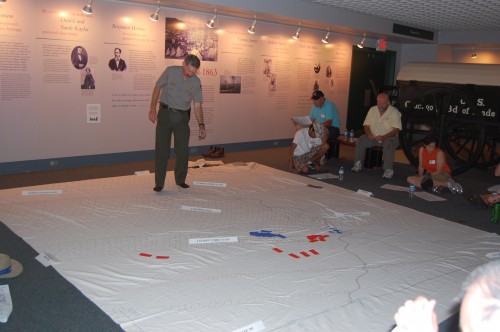
|
Civil War History Class Enjoys Field Trip to Chickamauga Battlefield
The Callahan Leadership Fund enabled professor Sy Goodman and graduate student John Miller to bring together members of their “Military History of the Civil War” class for an all-day field trip to study the Chickamauga campaign and battlefield near Chattanooga, Tennessee on June 30, 2012.
Temperatures over 100 degrees didn't deter the group from touring the battlefield. This year marks the 150th anniversary year of the war. Members of the Civil War Round Table of Atlanta accompanied the group.
“This trip was awesome! I never dreamed I would get to go on such an incredible field trip,” said INTA student Juliana Crim. “This will be the highlight of my time at Georgia Tech!”
The Callahan Leadership Fund was established to stimulate research and education related to global technology and national security.
|
IAC Faculty and Students Are Blogging
Faculty in Ivan Allen College of Liberal Arts are commenters on the GT current events blog. Here are some of our experts who've posted:
School of Economics
Danny Boston, Christine Ries
School of History, Technology, and Society
Jennifer Singh
The Sam Nunn School of International Affairs
John Garver, Margaret Kosal, Lawrence Rubin
School of Literature, Media, and Culture
Philip Auslander, Ian Bogost, Carl DiSalvo, Janet H. Murray, Lisa Yaszek
School of Public Policy
Marilyn Brown, Robert Rosenberger
IAC students shared their research and experiences in Europe, China, and the U.S. West Coast.
|
|

